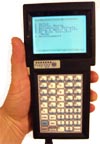 |
 |
Tcl for Embedded Applications |
 |
 |
Tcl for Embedded Applications |
These procedures may be used to create, modify, read, and delete Tcl variables from C code. Tcl_SetVar and Tcl_SetVar2 will create a new variable or modify an existing one. Both of these procedures set the given variable to the value given by newValue, and they return a pointer to a copy of the variable's new value, which is stored in Tcl's variable structure. Tcl keeps a private copy of the variable's value, so the caller may change newValue after these procedures return without affecting the value of the variable. If an error occurs in setting the variable (e.g. an array variable is referenced without giving an index into the array), then NULL is returned.
The name of the variable may be specified in either of two ways. If Tcl_SetVar is called, the variable name is given as a single string, varName. If varName contains an open parenthesis and ends with a close parenthesis, then the value between the parentheses is treated as an index (which can have any string value) and the characters before the first open parenthesis are treated as the name of an array variable. If varName doesn't have parentheses as described above, then the entire string is treated as the name of a scalar variable. If Tcl_SetVar2 is called, then the array name and index have been separated by the caller into two separate strings, name1 and name2 respectively; if name2 is zero it means that a scalar variable is being referenced.
The flags argument may be used to specify any of several options to the procedures. It consists of an OR-ed combination of any of the following bits:
Tcl_GetVar and Tcl_GetVar2 return the current value of a variable. The arguments to these procedures are treated in the same way as the arguments to Tcl_SetVar and Tcl_SetVar2. Under normal circumstances, the return value is a pointer to the variable's value (which is stored in Tcl's variable structure and will not change before the next call to Tcl_SetVar or Tcl_SetVar2). The only bits of flags that are used are TCL_GLOBAL_ONLY and TCL_LEAVE_ERR_MSG, both of which have the same meaning as for Tcl_SetVar. If an error occurs in reading the variable (e.g. the variable doesn't exist or an array element is specified for a scalar variable), then NULL is returned.
Tcl_UnsetVar and Tcl_UnsetVar2 may be used to remove a variable, so that future calls to Tcl_GetVar or Tcl_GetVar2 for the variable will return an error. The arguments to these procedures are treated in the same way as the arguments to Tcl_GetVar and Tcl_GetVar2. If the variable is successfully removed then 0 is returned. If the variable cannot be removed because it doesn't exist or because a trace is active for it, then -1 is returned. If an array element is specified, the given element is removed but the array remains. If an array name is specified without an index, then the entire array is removed.
Copyright © 1989-1994 The Regents of the University of California. Copyright © 1994-1996 Sun Microsystems, Inc.